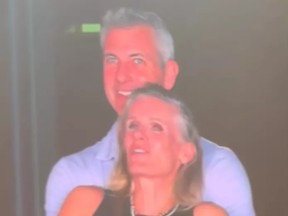
Article content
If you want to know how far harassment protections have expanded in Canadian workplace law today, look no further than the Coldplay concert debacle.
THIS CONTENT IS RESERVED FOR SUBSCRIBERS ONLY
Subscribe now to read the latest news in your city and across Canada.
- Exclusive articles from Barbara Shecter, Joe O'Connor, Gabriel Friedman, and others.
- Daily content from Financial Times, the world's leading global business publication.
- Unlimited online access to read articles from Financial Post, National Post and 15 news sites across Canada with one account.
- National Post ePaper, an electronic replica of the print edition to view on any device, share and comment on.
- Daily puzzles, including the New York Times Crossword.
SUBSCRIBE TO UNLOCK MORE ARTICLES
Subscribe now to read the latest news in your city and across Canada.
- Exclusive articles from Barbara Shecter, Joe O'Connor, Gabriel Friedman and others.
- Daily content from Financial Times, the world's leading global business publication.
- Unlimited online access to read articles from Financial Post, National Post and 15 news sites across Canada with one account.
- National Post ePaper, an electronic replica of the print edition to view on any device, share and comment on.
- Daily puzzles, including the New York Times Crossword.
REGISTER / SIGN IN TO UNLOCK MORE ARTICLES
Create an account or sign in to continue with your reading experience.
- Access articles from across Canada with one account.
- Share your thoughts and join the conversation in the comments.
- Enjoy additional articles per month.
- Get email updates from your favourite authors.
THIS ARTICLE IS FREE TO READ REGISTER TO UNLOCK.
Create an account or sign in to continue with your reading experience.
- Access articles from across Canada with one account
- Share your thoughts and join the conversation in the comments
- Enjoy additional articles per month
- Get email updates from your favourite authors
Sign In or Create an Account
or
Article content
While most observers seem to agree that the two colleagues caught canoodling at a Boston Coldplay concert — the chief executive and head of HR for U.S. tech company Astronomer — have been appropriately (and very publicly) shamed, there are divisions on the question of professional punishment and accountability.
Article content
Article content
Article content
I have read arguments suggesting that the relationship, while extramarital, was between two consenting adults, and therefore not deserving of reprimand or termination, or perhaps even investigation. Or that the company had no interest in getting involved, since there was no evidence of coercion or complaints of favouritism or violation of company policies.
Article content
By signing up you consent to receive the above newsletter from Postmedia Network Inc.
Article content
None of this is reflective of Canadian law today.
Article content
First, all potential harassment must be investigated, whether there is a complaint or not. The fact that a relationship between a superior or subordinate is ostensibly “consensual” does not end the issue legally.
Article content
As the Ontario Court of Appeal noted last month in a case involving Metrolinx: “There are many reasons why a victim of harassment might choose not to pursue an official complaint, none of which erase the harassing behaviour or the employer’s obligation to investigate it to protect the workplace from a hostile or demeaning environment. … (A lack of complaint) does not relieve an employer of its statutory duty (under the Occupational Health and Safety Act of each province) to conduct an investigation” into harassment.
Article content
Article content
The Court of Appeal in that case made clear that the obligation of an employer to investigate potential harassment is not just owed to the potential victim but to all employees in that workplace.
Article content
Article content
But does the apparent affair between the CEO and HR head qualify as harassment, which therefore must be investigated?
Article content
In 2001, there was a groundbreaking decision by the Ontario Court of Appeal in Simpson v. Consumers Association of Canada, in which the court made clear that there should be no assumption that a relationship is consensual even if it might appear so. Instead, an evaluation of the imbalance of power must occur to see if there may be factors affecting the individual’s consent (scared of losing job, afraid of reprisal, etc.).
Article content
“It is an error to ignore the supervisory role of the alleged harasser and to treat him as one of the employees. … Mr. Simpson may well have viewed all of his conduct as consensual and therefore as welcome. Because of the power imbalance in an employee’s relationship with a supervisor, and the perceived consequences to objecting to a supervisor’s behaviour, particularly when the behaviour is not directed specifically at that employee … an employee may go along with the conduct. In those circumstances, the employee will be effectively consenting to unwelcome conduct because she feels constrained from objecting”

.jpg) 18 hours ago
1
18 hours ago
1
 English (US)
English (US)